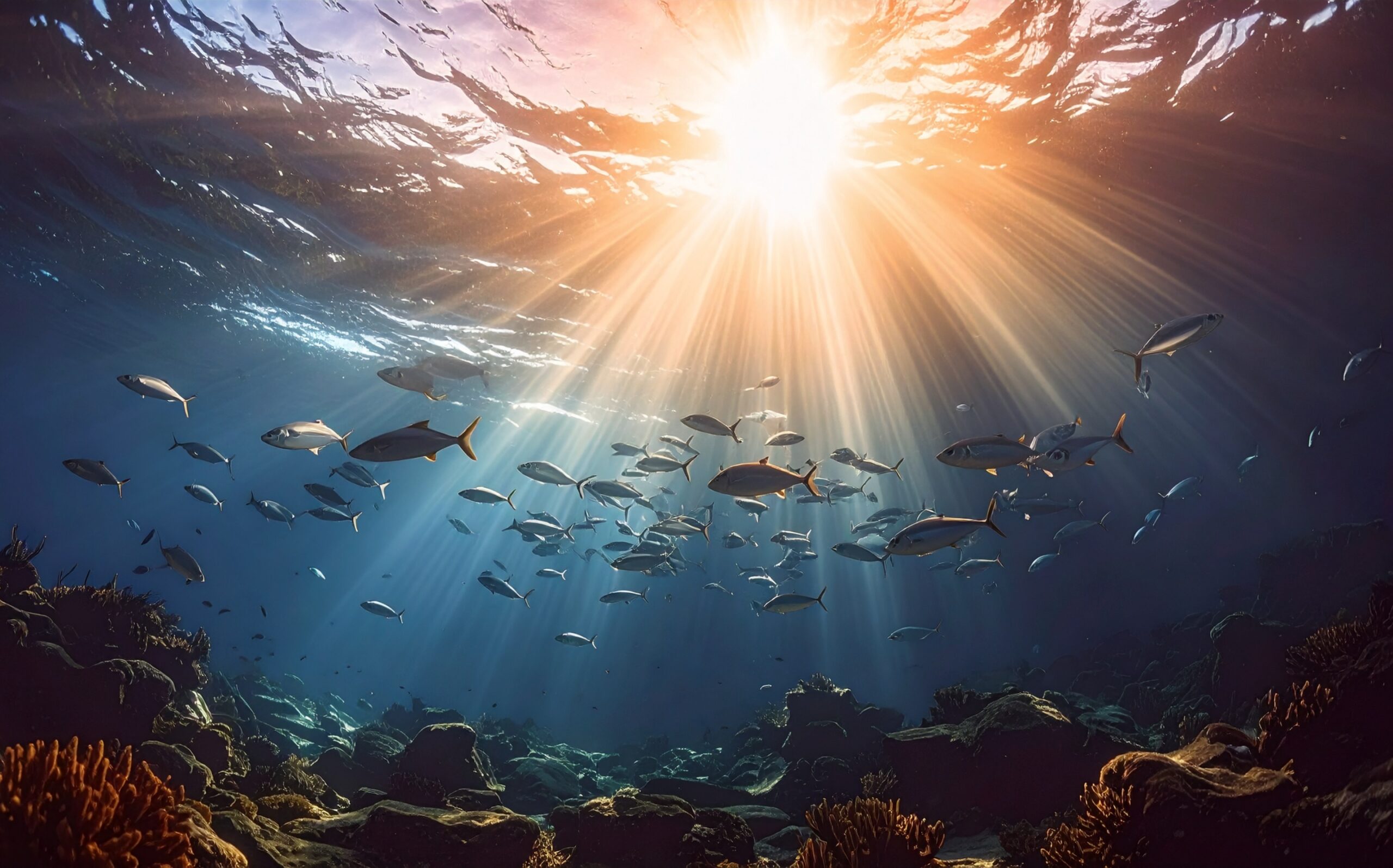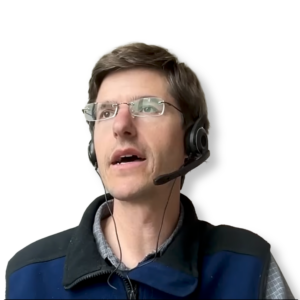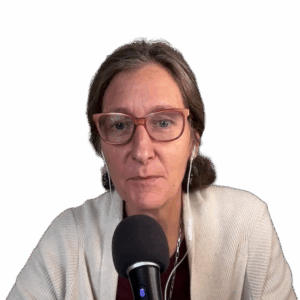
Ep 179 | Malin Pinsky
Malin Pinsky — The Fish are Fleeing: How Shifting Marine Ecosystems are Upending Life
Description
For all of human history, the oceans and the life within them have remained a stable and fundamental part of Earth as we know it. Yet, for the past few decades, fisheries and scientists alike have observed massive migrations in marine ecosystems unlike anything we’ve ever witnessed. What is driving these unprecedented movements, and how are they rippling out to affect every aspect of life?
In this conversation, Nate is joined by marine ecologist Malin Pinsky, whose decades of research shed light on the dramatic migrations of marine species due to rising ocean temperatures. Malin breaks down the science behind these changes – from declining oxygen levels pushing fish toward the poles, to the cascading impacts on intricate marine food webs, as well as the growing threat of localized extinctions among key fishery species.
How has a cultural disconnect from the importance of biodiversity and the interdependence of life led to such a drastic impact on the function of our oceans? What do these changes mean for humanity, including impacts on global food security and geopolitical stability? Finally, could reconnecting with the ocean’s abundant, diverse ecosystems help us reduce our impact on these deep, blue pillars of life?
About Malin Pinsky
Malin Pinsky is an Associate Professor in the Department of Ecology & Evolutionary Biology at the University of California Santa Cruz with expertise in the adaptation of ocean life to climate change and applications to ocean conservation and fisheries. His more than 120 publications have appeared in Science, Nature, and other journals.
He is a Fellow of the American Association for the Advancement of Science, an Earth Leadership Fellow, and an Early Career Fellow of the Ecological Society of America. Pinsky serves on advisory boards for the Beijer Institute of the Royal Swedish Academy of Sciences, the non-profit Oceana, and the Chewonki Foundation. He grew up exploring tidepools and mountains in Maine.
In French, we have a motto that says that a simple drawing is often better than a long explanation. Jean-Marc Jancovici Carbone 4 President
That’s very understandable because with left atmosphere thinking, one of the problems is that you see everything as a series of problems that must have solutions. Iain McGilchrist Neuroscientist and Philosopher
We can’t have hundreds and hundreds of real relationships that are healthy because that requires time and effort and full attention and awareness of being in real relationship and conversation with the other human. Nate Hagens Director of ISEOF
This is the crux of the whole problem. Individual parts of nature are more valuable than the biocomplexity of nature. Thomas Crowther Founder Restor
Show Notes & Links to Learn More
Download transcript00:00 – Malin Pinsky, Works
01:20 – Poleward migration observed in many populations, Marine-species specific migration patterns
02:35 – University of California – Santa Cruz, Institute of Marine Sciences
02:46 – Humans co-evolved near water, Evolution out of the ocean
03:10 – The vitalness of oceans, Additional Information
04:16 – A large percentage of humans live within 100 km of the ocean
04:33 – Coastal Property patterns
05:30 – Global Change Research Group
05:35 – Marine species migration patterns projection from Global Change Research Group
05:50 – Largest mass movement of marine life towards the poles, Study,
Causes:
Prey shifting, (Additional Information)
Decreasing oxygen levels, (Study)
06:20 – Ripple effects:
Coastal economies (Additional Information)
International relations (Additional Information)
06:58 – Daniel Pauly, TGS Episode + Reality Roundtable, Gill-Oxygen Limitation Theory
07:59 – Fish follow their preferred temperatures closely
08:43 – Largest change in temperature since the last ice age
09:00 – 120,000 years ago is the last time it was as warm as it is right now, (Additional Information)
09:35 – The oceans have not warmed as quickly as the land
09:50 – More than 90% of the excess heat from anthropogenic climate change has ended up in the oceans
10:13 – Ocean surface has warmed 0.9°C, Land surface has warmed 1.6°C
10:25 – Ocean ecosystems are more sensitive to temperature shifts,
Additional Articles:
Greater vulnerability to warming of marine versus terrestrial ectotherms
Sea animals are more vulnerable to warming than are land ones
Mechanisms, detection and impacts of species redistributions under climate change
10:49 – Marine species are migrating poleward faster than terrestrial species
11:15 – Atlantic Surf Clams migration patterns
12:30 – Ocean temperature warming slowing as depth increases
13:01 – Photic Zone, Phytoplankton, Vision in fish
14:00 – Continental Shelf, Formation
15:10 – Temperature and Life, Ectotherms
Additional Articles:
The evolution of critical thermal limits of life on Earth
Thermal tolerance patterns across latitude and elevation
15:40 – Water temperature increase leads to higher metabolic demand for ectotherms, (Additional Information)
16:21 – Temperature affects protein structures and cell membrane permeability,
Additional Articles:
The Well‐Temperatured Biologist
The Physiology of Global Change: Linking Patterns to Mechanisms
16:42 – Thermal-Safety Margin
16:59 – Temperature tolerance study by Global Change Research Group
17:32 – Marine species live closer to their upper thermal limit than terrestrial species
18:59 – Atlantic cod study,
Additional Studies:
Slow adaptation in the face of rapid warming leads to collapse of the Gulf of Maine cod fishery
Projecting shifts in thermal habitat for 686 species on the North American continental shelf
19:55 – The Great Lakes, The Land of 10,000 Lakes
20:34 – Freshwater species population changes
21:30 – Monterey Bay has the highest diversity of marine mammals in the world
21:50 – Ecosystem Productivity, Upwelling
22:29 – Dolphins appearing further north
22:39 – North Atlantic Right Whale – critically endangered, showing up in Canada
23:12 – Copepod
23:30 – Issue of net entanglement with North Atlantic Right Whale
23:44 – Delta (change in) temperature anomaly largest in poles
24:21 – Global warming is causing a more pronounced dip in marine species richness around the equator
24:59 – Some corals can tolerate higher temperatures but not all
25:25 – Coral bleaching
25:50 – Importance of coral reefs
26:30 – FishGlob Project
27:00 – Funding for orgs like NOAA and NASA under threat
29:05 – Local extinction – ‘extirpation’
29:31 – Galapagos Damselfish extinction
29:50 – End-Permian Extinction, Additional drivers of the End-Permian Extinction
30:10 – Corey Bradshaw, TGS Episode
30:15 – Climate Change and Species Extinction
30:31 – 10% species extinction by 2100, Study Malin references
31:20 – Extinction Debt, More: Extinction debt: a challenge for biodiversity conservation
31:33 – Atlantic Meridional Overturning Circulation slowing down, TGS Episode
32:10 – Atlantic Cod migration patterns
33:22 – Oceanographic models of oxygen levels in ocean
33:45 – Mariana Trench
34:00 – Oxygen generally decreases as ocean depth increases and why that matters
34:29 – Oxygen Minimum Zone becoming larger
35:40 – Peter Ward, Under a Green Sky, TGS Episode + Reality Roundtable
35:50 – Ocean Stratification, Ocean stratification study
36:20 – Oxygen and Capacity Limited Thermal Tolerance, (Additional Information)
36:48 – Black Sea Bass study
38:57 – Summer Flounder changes
39:30 – Virginia clam processing plant closed and new one opened in Massachusetts
39:47 – Mackerel Trade War, lost sustainable status
43:18 – Thomas Crowther, TGS Episode
45:01 – Greenhouse Gases
45:57 – “Specific Heat” of water
48:53 – Sustainable Seafood, Certified Sustainable, Fishing regulations in US
50:38 – Monterey Bay Aquarium Seafood Watch Cards, Marine Stewardship Council
50:50 – Farmed vs. Wild Salmon
53:35 – Giant Kelp northward migration
57:29 – Evolutionary dynamics may aid marine species survival
Coral Case Studies:
Coral conservation in a warming world must harness evolutionary adaptation
57:37 – Smithsonian National Museum of Natural History Fish Collection
1:01:35 – Banana Slugs






